
Pope Leo III was bishop of Rome and ruler of the Papal States from 26 December 795 to his death. Protected by Charlemagne from the supporters of his predecessor, Adrian I, Leo subsequently strengthened Charlemagne's position by crowning him emperor. The coronation was not approved by most people in Constantinople, although the Byzantines, occupied with their own defenses, were in no position to offer much opposition to it.
Vincent of Lérins was a Gallic monk and author of early Christian writings. One example was the Commonitorium, c. 434, which offers guidance in the orthodox teaching of Christianity. Suspected of semi-Pelagianism, he opposed the Augustinian model of grace and was probably the recipient of Prosper of Aquitaine's Responsiones ad Capitula Objectionum Vincentianarum. His feast day is celebrated on 24 May.

The Patriarch of Alexandria is the archbishop of Alexandria, Egypt. Historically, this office has included the designation "pope".

The East–West Schism, also known as the Great Schism or the Schism of 1054, is the break of communion between the Roman Catholic and Eastern Orthodox churches since 1054. A series of ecclesiastical differences and theological disputes between the Greek East and Latin West preceded the formal split that occurred in 1054. Prominent among these were the procession of the Holy Spirit (Filioque), whether leavened or unleavened bread should be used in the Eucharist, iconoclasm, the coronation of Charlemagne as Emperor of the Romans in 800, the Pope's claim to universal jurisdiction, and the place of the See of Constantinople in relation to the pentarchy.

Isidore of Kiev, also known as Isidore of Thessalonica, was a prelate of Byzantine Greek origin. From 1437 to 1441 he served as the Metropolitan of Kiev and all Rus' in the patriarchate of Constantinople of the Eastern Orthodox Church. He was a supporter of the Union of Florence which he proclaimed in Hagia Sophia on 12 December 1452. In the Latin Church, Isidore was the cardinal bishop of Sabina, Archbishop of Cyprus, Camerlengo of the Sacred College of Cardinals and the Latin Patriarch of Constantinople.
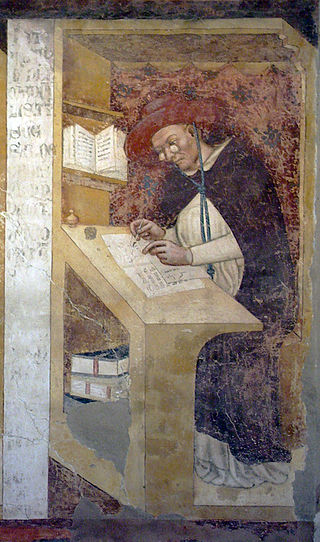
Hugh of Saint-Cher, O.P. was a French Dominican friar who became a cardinal and noted biblical commentator.
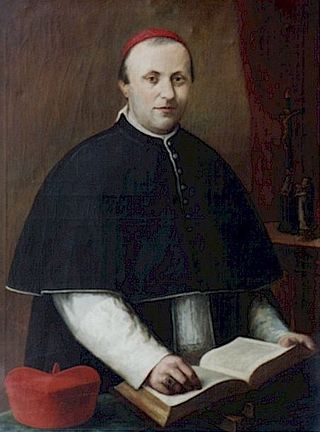
Tommaso Maria Zigliara, OP was a Corsican priest of the Catholic Church, a member of the Dominicans, a theologian, philosopher and a cardinal.
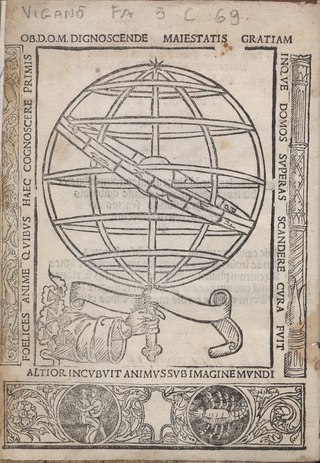
Sylvester Mazzolini, in Italian Silvestro Mazzolini da Prierio, in Latin Sylvester Prierias (1456/1457–1527), was a theologian born at Priero, Piedmont; he died at Rome. Prierias perished when the imperial troops forced their way into the city, leading to the Sack of Rome.

Thomas of Jorz was an English Dominican theologian and cardinal.

Peter Paludanus was a French theologian and archbishop.
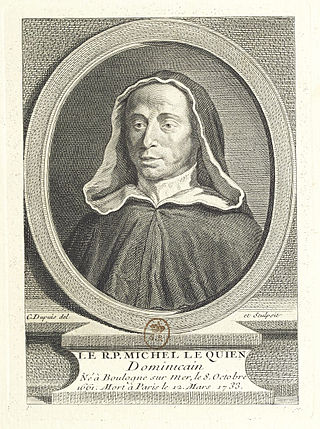
Michel Le Quien was a French historian and theologian.
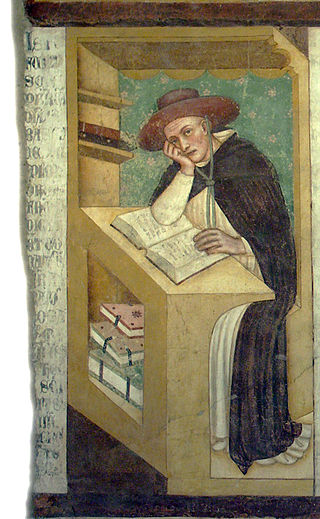
Annibaldo Annibaldi, also known as Annibaldo degli Annibaldi, was an Italian Catholic theologian,

John Slotanus was a Dutch Roman Catholic polemical writer. He lived and worked most of his life in Cologne.
John of Ragusa was a Croatian Dominican theologian. He died at Lausanne, Switzerland in 1443.

Peter Nigri, known also as Peter George Niger, was a Dominican theologian, preacher and controversialist.
John of Montson was an Aragonese Dominican theologian and controversialist. His refusal to tolerate other beliefs regarding the Immaculate Conception resulted in his condemnation and clandestine exile to Spain.
Confessor of the Faith is a title given by some Christian denominations. In Catholicism and Eastern Orthodoxy, Christians who professed their faith in times of Christian persecution and therefore had to suffer persecution, expulsion, torture, mutilation and imprisonment, but not directly undergo martyrdom, are called confessors. Later, popes, bishops, abbots, kings and hermits were also counted among the confessors.
Lancelotto Politi was an Italian Dominican canon lawyer, theologian and bishop.
Precedence signifies the right to enjoy a prerogative of honor before other persons; for example, to have the most distinguished place in a procession, a ceremony, or an assembly, to have the right to express an opinion, cast a vote, or append a signature before others, to perform the most honorable offices.
The history of the filioque controversy is the historical development of theological controversies within Christianity regarding three distinctive issues: the orthodoxy of the doctrine of procession of the Holy Spirit as represented by the Filioque clause, the nature of anathemas mutually imposed by conflicted sides during the Filioque controversy, and the liceity (legitimacy) of the insertion of the Filioque phrase into the Nicene Creed. Although the debates over the orthodoxy of the doctrine of procession and the nature of related anathemas preceded the question of the admissibility of the phrase as inserted into the Creed, all of those issues became linked when the insertion received the approval of the Pope in the eleventh century.












